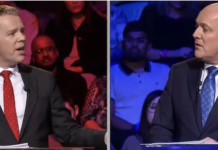The Finance ministers debates in Queenstown last night, (Thursday 14 September) was a missed opportunity for Labour. Overall everyone spoke well and had confidence, when there were so many reasons to doubt their confidence.
Grant Robertson spoke coherently and targeted issues well. A business audience so not to be talked down to. However, he needed more economic context. Yes talked Labour dealt with covid, saved many lives. And that the beginning of covid business was begging to be saved, and they were. But really he needed to blame our economic problems on a worldwide trend of inflation, and the Reserve Bank pushing the economy into a technical recession to control it.
This is why Labour has been hamstrung in taking actions to alleviate the cost of living crises, as spending will push up demand which pushes up inflation ( in a textbook approach). It’s almost impossible to win an election in a recession which is why Labour is behind. But Labour, foolishly, are following a textbook solution to fix inflation and pull us out of the recession, and businesses don’t really care, it’s about their profits. Labour has not taken risks to win and risks are winning strategies. There are other ways to control inflation, e.g the IMF say’s raising taxes is one way. I’ll put a link to some IMF comment below. What a missed opportunity. But there were other ways.
Nicola Willis, spoke clearly and confidently and only looked in trouble twice. National are sticking to expected sales tax revenue on foreigners house purchasers – clearly doesn’t stack up. Jack Tame pointed out the obvious impact on pushing up domestic house prices as people want foreign sales. In a years time if it doesn’t collect the revenue they expect; instead of rock solid numbers it will be rock solid rubbish National. Fiscally irresponsible and reckless behaviour to not have a plan b. Bring in a wealth tax, to cover the hole. National look reckless on their budget because it means hacking into public services to fill the gap.
On conservation issues Nicola tried to tell the audience that she would also protect all the things Grant and James Shaw talked about (e.g. Conservation get 1% of NZ Govt funds(?) to protect 30% of NZ’s land mass – and its being overrun with introduced pests) but then some in the audience called out National is cutting Conservations budget by 6%. To which she said ‘only the backroom positions’. And they called back that is where the funding for pest protection is. It was an obvious damning point on her whole economic logic and she had no comeback. It came across strongly.
David Seymour, talked confidently and clearly out of both sides of his mouth – i.e. cutting back on wasteful government and just cutting back. But then correctly claiming NZ has massively underinvested in productivity and infrastructure. But David never articulated a plan of how he would fund it. He will have a plan, and we can guess the deluded fantasy of encouraging private enterprise through tax cuts and contracts. But private enterprise is a costly solution; compared to the old Ministry of Works. Under investment is a deep seated problem needing a huge concentration of economic resources, something that private enterprise won’t want to commit to without safe recompense.
James Shaw spoke best towards the end so he left an impression. Good on conservation. Good on net migration being 100,000 in a year, which is a city the size of Palmerston North so where is the new hospital, or the 4 high schools that sort of increase needs. But he has been there doing nothing to. But like all the others he plugged the emissions trading scheme. It’s a lemon. They know it but they just want to tweak it. It’s reminded me of the 60’s and 70’s when the most taken out books from the library were the car manuals so you could fix your own car. After a while it was just easier to buy a new car, or a second hand import. Just get a tax on carbon and invest the money on transformation.
But the saddest part was the lack of diversity of views for dealing with inflation and the recession. This is because they all believe there is only one economy, (i.e. all economies have jobs, money, shops, buying things) and they mistake that facade as being the economy; when economy is the structure that holds up that facade. For example the social welfare state post WW2 to 1984 was a very different economy to the one we have now. It was stronger on sharing resources, had quite mild slow downs compared to today, had lots more small businesses and start ups. It did have problems largely caused by government underinvestment in some areas, e.g, railways. Our current economy has more bubbles and looks more unstable (2008).
And the proposed solutions are so uninspiring with all the tried before and failed policies like; tax cuts, public service efficiency cuts across every department (but some would be easier to take from than others e.g. MBIE could lose 12% and Conservation nil(?). Roads, and more roads. Immigration. All were onboard with mass immigration, that leaves some of our people behind so they get ignored and can’t get a job. Immigration to meet business needs is about driving down wages here.
To attract people they often pay more wages to immigrants than to the New Zealanders with the same skills sets and often better experience levels already in the same job. So our existing people leave, families are separated. Businesses simply don’t want to pay and/or take the effort to train people. Some of the contracts are like being indentured servants. I understand there are people coming to cook food in takeaways. It’s all wrong policy and they carry on. And that is creating pressure on housing (health and education) when the build options they pursue are not delivering affordable housing.
A strong emphasis on speaking firmly and confidently to hide the lack of substance and consistency.
There are better solutions than these and the only solution is voting and getting involved. We now can’t do one without the other. Labour needs people to join and push out the failing centrist clap trap. This election shows so clearly that a proper alternative vision is needed and the centre can’t win even when it does everything by the book. Our economy is failing because its structure is wrong and that has nothing to do with the facade
Note: To show how Labour has tied itself too much into neo-liberalism and into fear about not spending to mitigate cost of living crisis because it would stimulate demand because that risks inflation; I include the quote in italics below. To control inflation there are two areas of action: monetary policy (central banks) and fiscal policy (governments). (I don’t find this distinction that helpful for solutions as it is too constraining and misleading but it exists in the theory)
The IMF blog says – on inflation
The economic model used in the chapter incorporates inequality in incomes, consumption, and asset holdings. It shows that when central banks act alone—without the support of fiscal policy—they need to hike interest rates substantially to fight inflation. Fiscal tightening makes it possible to increase interest rates by less to contain inflation.
But to safeguard the poor—who benefit more from public services—tax hikes or cuts in lower-priority spending must be combined with larger transfers. This strategy results, by design, in no drop in consumption for the poor, but also in a lower decline in overall consumption.
by: Vitor Gaspar, Carlos Eduardo Goncalves, Paolo Mauro, Marcos Poplawski-Ribeiro April 3, 2023
I don’t see this as the only solution and I think it lacks a wider view. BUT
The poor in New Zealand can be protected with tax hikes on the wealthy (e.g wealth tax? or other changes) and then transfers of wealth to the poor. Labour didn’t consider the tax hikes as a way to suppress demand, they largely just did the cuts, fiscal tightening. (I love the prescription’s free, and the reduced price transport. etc)
Labour rock but they did not take risks. There is still time; if they want to win.





Labour would have won in another landslide if they’d run on a traditional Savage/Atlee style platform and proclaimed that ‘Labour will save the country from a Great Depression once again’. The solution to the current economic problems are all there in the policies of 1930s-1960s Labour.
Of course they’re too corrupt for that to ever be allowed again. The constituency party members have now been deprived of the vote, and thus nobody outside the parliamentary party had a say in the last leadership ballot at all.
Unfortunately, Labour have become tainted with their racist ideaology.
Really Bob the First/ Bob/ John?
Racist ideology is only seen through a racists eyes. You and your 3 pseudonyms fit the bill.
… and how many pseudonyms do you have Bertie?
… and failed policies.
Sorry Krautie whadaya on about?
Yes Nationals failed policies is something we can all agree on all as a result of a failed low wage economy, neoliberalism and an unbelievable unintelligent theory on trickle down. Ratty you are on the money.
What do you think “Bertie”( whomever you are)?
“After graduation, she took up a position as a research and policy advisor for Bill English and went on to serve as a senior advisor to John Key in 2008”
She’s never had a real job in her life!
Much like Ardern and Hipkins
That’s not true she worked in a senior role for Fonterra.
I can only but agree NSC…
https://www.businessinsider.com/how-bad-is-inequality-trickle-down-economics-thomas-piketty-economists-2021-12
bert agrees with himself.
Magies,, back in town.
Willis can’t count. I think she has as much talent as that UK PM who got outlasted by a Lettuce ffs! The one that killed the Queen! Crashed the UK economy and Blew Up the Crimean Bridge! Liz something.